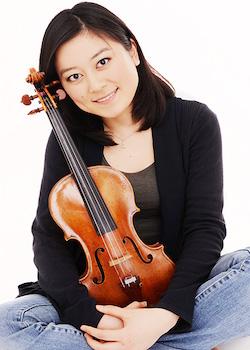An interview with Lisa Ueda

Interview by Mike Sullivan
Lisa Ueda is the kind of person who lights up rooms and who immediately makes you feel at ease, within a few minutes of speaking with her you feel as if she is an old friend; it is a talent which surely has been honed by the busy lifestyle of being a musician. She has benefited from an international education which included study at the prestigious Royal Academy of Music and has also performed internationally. In addition as part of the Ueda/Rinaldo Duo with Daniele Rinaldo she has an upcoming concert at Wigmore Hall which will be followed soon after with a tour in Japan.
Despite a busy schedule this charming and talented young lady sat down with us for a little chat.
Please introduce yourself and your education in both Japan and the UK.
My name is Lisa Ueda; I work regularly in Europe and Asia as a solo violinist and recitalist. I was born in northern Osaka, my education started at Kyoto International School, and this was followed soon after at Osaka International School, where I obtained the IB Bilingual Diploma.
I came to the UK to study at the Royal Academy of Music as an ABRSM International Scholar, and completed both my BMus and MA there.
I believe my upbringing has helped me both feel at home in a diverse, multicultural city as London, and also feel comfortable travelling anywhere due to the nature of my profession.
Can you tell us about your upcoming concert at Wigmore Hall?
The Wigmore Hall is a leading international recital venue and is an essential platform for the world’s most sought-after soloists and chamber musicians. Soon after I arrived in the UK, my next goal was to one day perform at the Wigmore. Again, at that time, I thought this could be an impossible aspiration, and on one of my first visits, I took a picture in front of it! As I will be performing there on Sunday 12 April, I am wondering where I should take my next picture…!
What will you play at this concert?
We have an exciting programme ready – the outer pieces of the recital, sonatas by Janáček and Respighi, are absolute masterpieces written in the same period 1914-1916. Janáček’s work is about the First World War, where you will experience gripping tension, sad nostalgia of the past, mixed with sounds imitating flying bombshells; and the Respighi is energetic, and quite possibly one of the most passionate pieces I have played! The recital culminates in a striking passacaglia in which the themes and motives of the entire work, constantly exchanged between violin and piano, are masterfully interwoven.
Sandwiched between these two late-Romantic pieces is the world première of Robert Matthew-Walker’s second Sonata, and Mozart’s gloriously lyrical B-flat Major Sonata, whose operatic character acts as a moment of rest from the excitement and intensity of the outer parts of the evening.
What was the trigger to study music?
At age 4, I said to my mum that I would like to learn the violin, flute, and the harp – to which she answered “Hmmm.. Shall we start with one, Lisa?” and I immediately decided on the violin. To this day, I have not yet had my flute and harp lessons…!
Why did you choose to study at the Royal Academy of Music in London?
At age 16 on an International Honour Orchestra trip, we visited London and we convinced our teacher to visit the RAM. At the time, I felt the RAM was ‘up in the clouds’ for me, and that I would never make it here again. So I asked my friend to take a photo of me on the front steps! The RAM has so much history and profile, so I thought the world had gone upside down when I heard I was accepted with a full scholarship!
How did the Ueda/Rinaldo Duo start?
We are most grateful to Michael Dussek, a renowned pianist and professor at the RAM, who suggested we play together. Daniele and I are complete polar opposites; and he knew that we would create a musical equilibrium between ourselves. I am convinced that if he hadn’t put us in touch, we most probably would not have met.
I understand that you play on a violin which dates back to 1596, how does it feel to hold such a piece of history in your hands?
I am very fortunate to be able to play on a 1596 Brothers Amati violin which has been kindly loaned to me from Filippo Protani Violins. If I were to put a character to it, I think she is on the feminine spectrum, a wise granny – someone who has seen and lived the world, with a constant twinkle in her eyes.Her voice has a glorious shimmer and eloquence,Although she definitely knows when to ‘put on the trousers.’ Indeed, it is a piece of history – and I believe our duty today is to make sure these instruments get passed on through the many generations, and continue to touch the hearts of many audiences to come.
What is your favourite thing about Japan, and about the UK?
My favourite thing about Japan is first and foremost, my family. It is where I come from, and I adore Japanese traditions. The UK has seen me grow as an adult, and has given me the opportunities to become the artist I am today.

